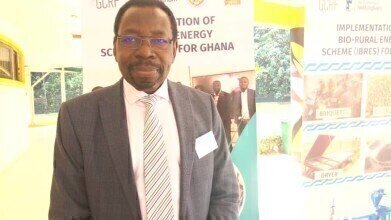-
 Professor Jo Darkwa, Faculty of Engineering, University of Nottingham
Professor Jo Darkwa, Faculty of Engineering, University of Nottingham
News & Views
Cocoa Husks Fuel Secondary Industry Prospects in West Africa
Mar 12 2019
A project to generate electricity from discarded cocoa pod husks is set to benefit West African farming communities currently with little or no access to grid power. Led by the University of Nottingham, development of the green technology would also improve socio-economic stability for cocoa producers in rural Ghana.
“Ghana is the second highest producer of cocoa in the world and every ton of cocoa beans harvested generates 10 tons of cocoa pod husks. In the past, this waste material was underutilised,” said principal investigator, Jo Darkwa, Professor of Energy Storage Technologies in the Faculty of Engineering.
“However, feasibility studies indicate that cocoa pod husks could be converted into valuable bio-fuels; an important energy supply for rural areas that have only 15% electricity coverage at present. If successful, this new bio-energy infrastructure would support the Ghanaian government’s aim for universal access to electricity by 2030.” The Implementation of Bio-Rural Energy Scheme (IBRES) project, backed by the UK Government’s Global Challenges Research Fund, aims to makes practical and economic use of the discarded cocoa pod husks.
In addition to energy production and distribution, local jobs would emerge for the collection and transportation, treatment, storage and processing of this potentially lucrative byproduct. A community energy cooperative model will also help the farmers to make money from their new bio-energy source and hence reduce poverty. The main tasks of the project are to:
1. Characterise the four different types cocoa pods commonly farmed in six regions of Ghana for their use as bio-fuels.
2. Design, build and evaluate a small-scale bio-power electricity generation unit that burns cocoa pod husks - a waste product in production – in a gasification system, which includes a gasifier, a 5 kWe diesel generator set, a solar drier and pelletiser.
3. Develop guidelines for setting up full-scale bio-energy schemes and their integration into rural communities.
4. Investigate stakeholders’ perceptions of the bio-energy scheme.
5. Develop community co-operatives and governance structures for cocoa-producing regions.
In addition to Professor Darkwa, the Nottingham-led project team involves Dr John Calautit, Dr Mark Worall, Dr Yuehong Su and Nii Nelson of the Buildings, Energy and Environment (BEE) Research Group; Dr Alison Mohr from the Institute of Science and Society; Dr Karen Robertson from the Advanced Materials Research Group and the School of Chemistry’s Professor Robert Mokaya.
Nottingham academics are also collaborating with the Centre for Energy, Environment and Sustainable Development (CEESD) Ghana, Ghana Cocoa Board (COCOBOD) and Kwame Nkrumah University of Science and Technology (KNUST) in Ghana where the bio-power unit will be installed and monitored by researchers.
Digital Edition
Lab Asia 31.2 April 2024
April 2024
In This Edition Chromatography Articles - Approaches to troubleshooting an SPE method for the analysis of oligonucleotides (pt i) - High-precision liquid flow processes demand full fluidic c...
View all digital editions
Events
Apr 28 2024 Montreal, Quebec, Canada
May 05 2024 Seville, Spain
InformEx Zone at CPhl North America
May 07 2024 Pennsylvania, PA, USA
May 14 2024 Oklahoma City, OK, USA
May 15 2024 Birmingham, UK

















